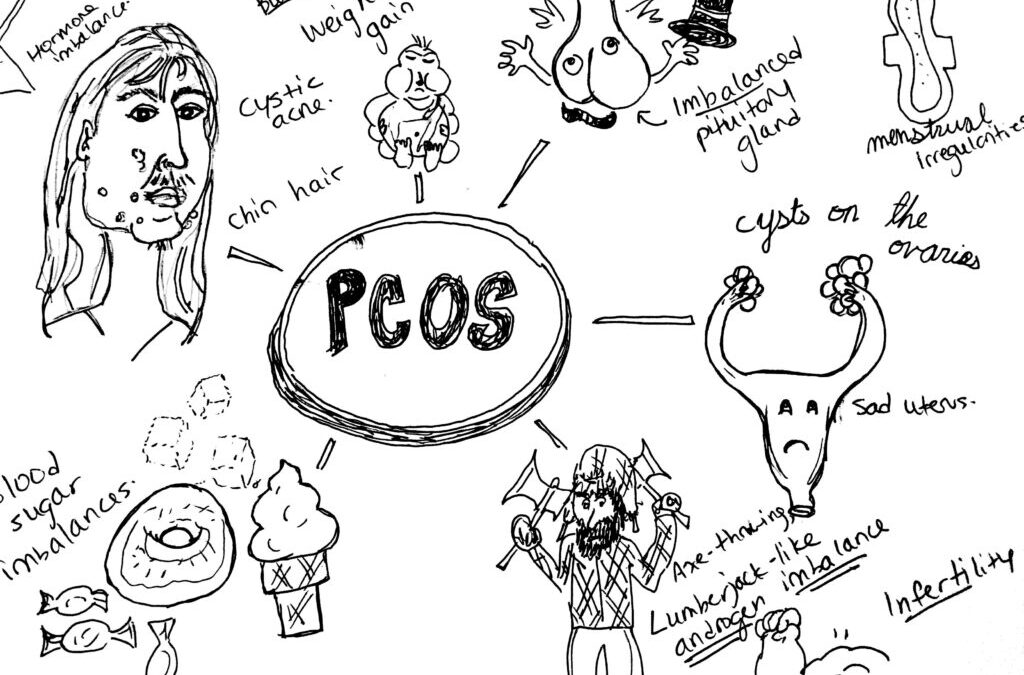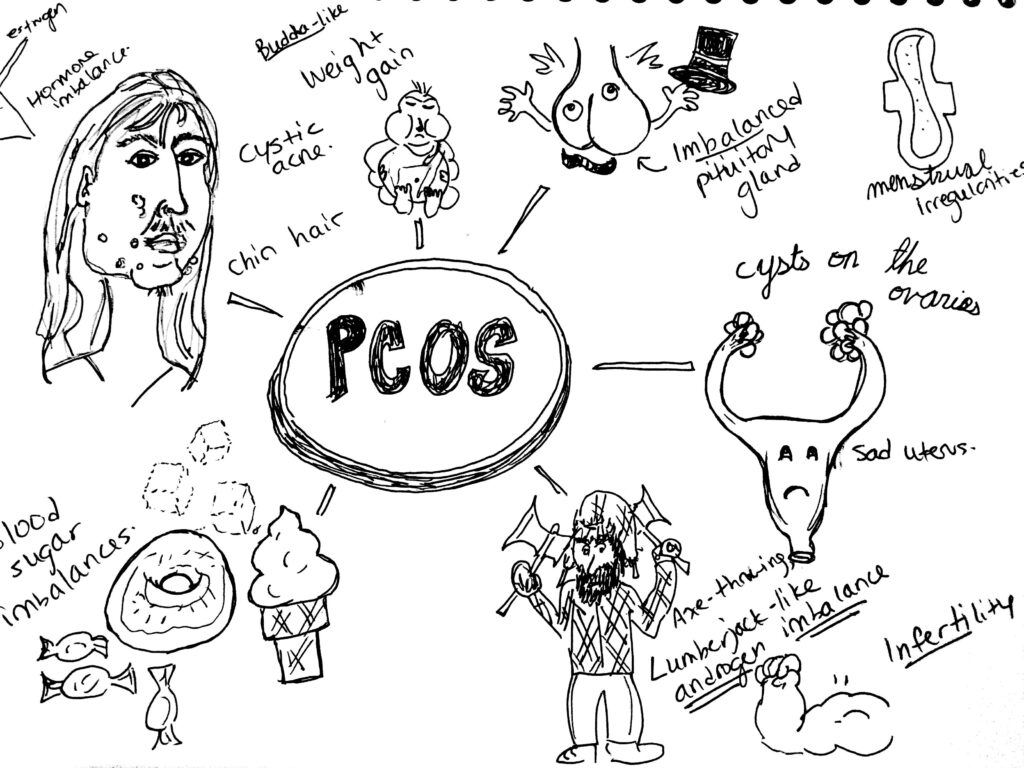
Polycystic Ovarian Syndrome: The Good, the Bad and the Hairy
 PCOS, or Polycystic Ovarian Syndrome, a condition which affects an estimated 10% of women in North America and is the most common endocrinological dysfunction in women.
PCOS, or Polycystic Ovarian Syndrome, a condition which affects an estimated 10% of women in North America and is the most common endocrinological dysfunction in women.
Its symptoms and the people it affects are as diverse as there are people affected; it’s one of my favourite conditions to treat.
Signs and Symptoms:
PCOS is characterized by hormone dis-regulation. Oftentimes it presents with cysts on the ovaries, but not always. In PCOS there is often elevated blood glucose and other markers of insulin resistance. There are often issues with menstruation: the absence of periods (amenorrhea), or heavy and irregular bleeding (dysmenorrhea). Weight gain is common—although some women with PCOS can be thin—as is hormonal acne and hirsutism, a nice word for male-pattern hair growth: excess hair growth around the chin and upper lip, the chest or navel region. Pelvic pain around ovulation may occur when cysts rupture. Infertility is common in women with this condition.
PCOS is a syndrome, rather than a disease, which means it presents as a collection of symptoms that can be varied in their presentation and severity. Lab work may read that estrogen, testosterone and LH (a hormone produced by the pituitary gland and ovaries) are high and progesterone and FSH (a hormone released by the pituitary gland) are relatively low. However, what brings a woman with PCOS or PCOS-like symptoms into my office is varied and usually consists of any combination of visible symptoms: hair growth, weight gain, acne, menstrual irregularities or infertility.
Etiology:
We are uncertain how the collection of symptoms that is PCOS arises. One prominent theory is that issues with blood sugar and insulin regulation create ovarian cysts or disruptions in the secretion of sex hormones. This causes the ovaries to release more LH, which has the power to raise testosterone. High insulin, testosterone and estrogen can cause weight gain, hair-growth, acne, absence of ovulation (anovulation) and the inability to maintain the uterine lining and therefore carry a pregnancy to term.
Diagnosis:
PCOS is diagnosed by symptoms. It involves a combination of symptoms: amenorrhea (or absence of menstrual periods), infertility, hair growth on the face, acne and insulin resistance. The presence of ovarian cysts, as detected on an ultrasound were once diagnostic, but many patients present with symptoms and are cyst-free. An increase in LH and testosterone, with lab values indicating insulin resistance and metabolic syndrome, can also lead doctors to suspect PCOS, when appearing in conjunction with other symptoms.
Because it is a syndrome, patients often come into my practice with a variety of complaints. Some come in to deal with their skin health, others want help with fertility or menstrual cycle regulation and many others come in with weight loss goals.
Conventional Treatment:
Treatment in conventional medicine is simple: oral contraceptives. If your testosterone is high and estrogen and progesterone are out of whack, the conventional medical system tells us to simply override natural hormone production, or lack thereof, with synthetic versions of the same thing. For my professional opinion on regulating hormones with oral contraception, see my post on the birth control pill (which I no longer take). These birth control pills often contain chemicals that prevent the secretion of male hormones. This helps clear up acne and hair growth.
Medication for type II diabetes, Metformin, is used to help regulate insulin. Patients experience weight loss on Metformin, as it helps control insulin resistance, however it also depletes vitamin B12, which means that regular injections of B12 are necessary to avoid deficiency symptoms. Further, Metformin doesn’t address the root cause of insulin resistance, which is most likely lifestyle and hormonal imbalance. This means that patients will be medicated (and therefore receiving B12 injections) for life.
I do not mean to negate the fact that oral contraception and Metformin have helped countless women. I respectfully acknowledge the fact that the lens I look through is one of a different, more natural and whole-bodied approach to medicine that aims to treat the individual by addressing the root cause of disease.
In short: I prefer to try it the naturopathic way first.
Naturopathic Treatment:
Lifestyle. Naturopathic remedies are very effective, but often quite involved. They begin with lifestyle modifications—a low glycemic index diet like the Mediterranean or the Paleo diets, that emphasize whole foods, like fruits, vegetables, healthy fats and lean protein and eliminate sugar, white flours and white carbohydrates. Exercise is important in treating PCOS. One of my professors advocates intense cardio, such as high-intensity interval training, or weight-lifting 5-6 days a week. This must be done for several months before effects are seen and blood sugar and other hormones are regulated.
Supplementation and botanicals. Myo-inositol, a B vitamin, is a first-line treatment for PCOS in the natural health world. The amount of research steadily growing behind its use should probably make this gentle and effective treatment first-line for treating PCOS in all healthcare fields. Studies show that, when dosed properly, inositol can regulate blood sugar, assist with weight loss and regulate menses, even promote fertility.
Herbs like Vitex agnus-castus, or chaste tree, can help regulate the balance between estrogen and progesterone. Spearmint and Serenoa repens, or saw palmetto, can help decrease male hormones in the body. Gymnema and berberine are other therapies useful for regulating blood sugar and helping with weight loss.
Ensure that you are receiving counsel from a licensed naturopathic doctor before supplementing. The dose and quality of supplements and herbs is essential to feeling better—don’t hack it in the health food store alone!
Acupuncture. Acupuncture has been shown to be effective for promoting fertility. I have had some good success in promoting pregnancy and fertility with acupuncture in my practice. Fertility clinics in Canada now use acupuncture before and after IVF treatments to ensure treatment success. It also helps to relieve stress and lower cortisol, which helps with insulin-lowering and blood sugar management.
In Traditional Chinese Medicine, PCOS can manifest as dampness, Qi or yang deficiency or issues with the Spleen or Kidneys. Acupuncture can help tonify and balance these patterns.
Homeopathy. I have had success using homeopathy in conjunction with lifestyle and supplementation in treating PCOS. Homeopathy acts deeply on the energetic level of disease, working on the level of emotions and sensations and working to address the energetic cause of disease. It involves a thorough interview and an individualized prescription from a licensed naturopathic doctor or homeopath.
Mind-Body Medicine. The ovaries are located at the level of the second chakra, which is an energetic centre in the body associated with sexuality and creativity. Christine Northrup, MD, asserts that the presence of ovarian cysts represents an energetic blockage in our creative power and unmet emotional needs. Louise Hay, author of “You Can Heal Your Life” tells us that ovarian cysts represent some sort of past hurt that we can’t let go of. Crying, journalling and identifying repressed emotions can help to remove these energetic blockages. In many women with PCOS, there is an imbalance in the identification with their femininity, or what it means to be a woman.
Sometimes our bodies alert us of imbalances in our emotional lives through the presence of physical symptoms. As a naturopathic doctor, it is essential I address all levels of the person—mentally, emotionally and spiritually, not simply physically.
PCOS is a diverse and challenging condition to treat that can cause a lot of hardship for the women who suffer from it. However, a diagnosis of PCOS can be an opportunity for growth and transformative healing through naturopathic medicine. For this reason, I find it can be one of the most interesting and rewarding conditions to treat. Contact me to find out more.


